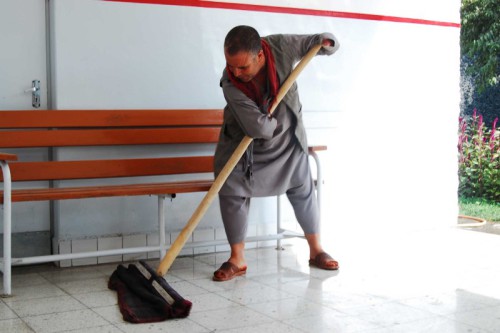The Royal College of Surgeons of England is one of the world’s most renowned and…

AFGHANISTAN: The Real Heroes Of The Conflict
 Let’s see if it’s possible to write a few lines from Lashkar-Gah without necessarily talking about death, shooting, or wounds to the body and soul. Let’s see if it’s possible to recount without having to repeat the painful recurrence of events — war, casualties, mass casualty, war, casualties, mass casualty — that is so typical of every day in this part of Afghanistan. We’ll talk about people then, but not about patients this time. We’ll talk about the lives of the people, without focusing on wheelchairs or prosthesis.
Let’s see if it’s possible to write a few lines from Lashkar-Gah without necessarily talking about death, shooting, or wounds to the body and soul. Let’s see if it’s possible to recount without having to repeat the painful recurrence of events — war, casualties, mass casualty, war, casualties, mass casualty — that is so typical of every day in this part of Afghanistan. We’ll talk about people then, but not about patients this time. We’ll talk about the lives of the people, without focusing on wheelchairs or prosthesis.
Today I want to tell you about my heroes.
My heroes are the surgeons who’ve been working here since this hospital opened. Those who, for more than ten years, have spent their days and nights in the operating theatre fixing the damage so often caused by their “brothers”. Each one of them has had to operate at least once on a relative, neighbour or friend. And each one of them has found, at least once, that it was too late to operate on a relative, neighbour or friend.
My heroes are our gardeners, who are out there even now, as I write, watering and pruning the plants and flowers. And now, as I write, the temperature out there is 48° C. But later, when it’s less hot, the hospital patients like to gather in those gardens of roses, sunflowers and flowering bushes. And those few square metres of colour and peace become a meeting place, an escape for the eye and the mind.
My heroes are our nurses — those who, as soon as there’s a mass casualty in the city, are here at the hospital gates within just a few minutes of the explosion, even if it’s their day off and nobody has called them. They want to put on their uniforms and lend a hand, straight away. Many of them have turned up at least once at the gates without their uniforms, because they themselves were the victims of the explosion.
My heroines are our female nurses working in the women’s and paediatric ward, who sometimes even challenge their families and demand to be able to work the night shifts, because they know the treatment in our hospital doesn’t stop when the sun goes down.
My heroes are also the cooks who, like everyone else during this month of Ramadan, don’t eat or drink during the day. But despite that, the entire day they prepare rice and vegetables, potatoes and meat, special diets for those who can’t chew and hyperproteic food for those who need it. Because food is no less a part of the treatment than an antibiotics drip. And my heroes know it.
My heroes are our guards, “armed” only with a transmitter, who spend their workdays outside the gate to check who’s coming in and out. They check what sort of air is blowing in the city since we all know this isn’t a quiet area, but the hospital has to be a quiet place, otherwise what would the patients do?
My heroines are also the laundry women — oh yes, without a doubt. The ones who bring us packs of snow-white sheets every morning, then see them come back red like the roses in our garden. It’s them who work their magic every time. And then the cleaners — other heroes armed with cloths and brooms. Some of them have one or two fingers missing, others a whole hand, because some of them have actually tried out our hospital beds as patients before coming here to clean them.
Today, they are my heroes. There are around 400 of them here with us. They haven’t got super-muscles or super-powers but just being able to say you’ve met them somehow helps set the world right.”
Written by Roberto, EMERGENCY nurse in Lashkar-Gah
If you want to read more about EMERGENCY’s work in Afghanistan, click here.



